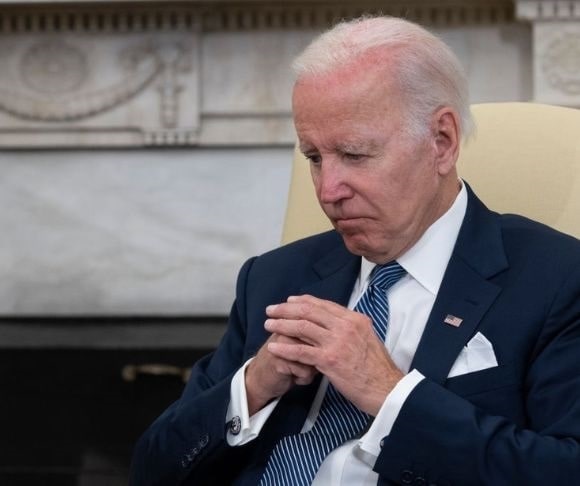
Joe Biden (Photo by Chris Kelponis-Pool/Getty Images)
Public opinion polling can be an unreliable animal – not least because one never knows whether some respondents are giving the pollsters what they believe is the “proper” or “politically correct” answer. So, when The New York Times, in cooperation with Siena College Research Institute, produces a survey that, according to the paper, indicates election polling isn’t looking so bad for Democrats, one must reach beyond the spin to determine the truth – or something approximating it.
 The survey in question polled 849 registered voters across the United States between July 5 and July 7 of this year. The sampling was fairly nonpartisan. In terms of party identification, 30% of respondents were Democrats, 29% Republicans, and 35% identified as Independent/Other.
The survey in question polled 849 registered voters across the United States between July 5 and July 7 of this year. The sampling was fairly nonpartisan. In terms of party identification, 30% of respondents were Democrats, 29% Republicans, and 35% identified as Independent/Other.
As one might expect, Joe Biden did not poll well in terms of favorability. He was viewed as very favorable or somewhat favorable by only 39% of those surveyed. His combined score for somewhat or very unfavorable was 58%, while 3% of the survey-takers were not sure or refused to answer the question. By comparison, former President Donald Trump scored the same overall in favorability and his total for somewhat or very unfavorable was 57%. As with Biden, 3% of voters responded “Don’t know” or declined to answer when asked about Trump. Perhaps interestingly, Trump’s “Very favorable” rating beat out Biden’s by 21% to 14%, while the latter was seen as “very unfavorable” by 40% to Trump’s 49%. That may reflect just how polarizing a figure Trump has become, even if due in large part to a very unfavorable media.
Florida Gov. Ron DeSantis (R) scored better than Biden and worse than Trump, when it came to how many respondents (19%) viewed him as very favorable. Twenty-eight percent saw DeSantis as very unfavorable.

Joe Biden (Photo by Chris Kelponis-Pool/Getty Images)
Election Polling Is Narrative Versus Reality
With regard to the upcoming midterm elections, this survey does not seem so bleak for Democrats, though it was notable that recent media coverage of issues like abortion and gun control may have had an effect. The question is, of course, whether that effect will last until November – still more than three months away, as of this writing.
Most election polling over recent months has suggested control of Congress will likely swing to the Republican Party. This survey does not reflect that, but the results are almost too close to call. Even though 77% of the voters polled said the United States is headed in the wrong direction and just 13% believed the country is on the right track, 41% said their preferred outcome in November was Democratic control of Congress, while 40% wanted the Republicans to take over. Nineteen percent answered “Don’t know” or refused to answer.
As for the way Biden is handling his job as president, 33% strongly or somewhat approved and 60% strongly or somewhat disapproved. And yet, if the 2024 presidential election were held “today,” 44% said they would back Biden, while 41% would support Trump. Ten percent were in favor of another candidate or said they would not vote, given that choice. Those results are interesting – perhaps even puzzling – when compared to the question of whether Biden should be renominated as the Democratic Party’s 2024 presidential candidate. Twenty-six percent said yes, but 64% believe another candidate should be nominated.

(Photo by Sean Rayford/Getty Images)
Perhaps the lesson is that Democrat voters still loathe Trump far more than they disapprove of Biden.
If anything is to be divined from this one survey, it is that election polling can be volatile and influenced by the narrative of the day. Of the voters polled, only 15% pointed to inflation and the cost of living as the most important problem facing the country today. The “state of democracy/Political division,” gun policies, and abortion – all major media narratives at the moment – came in next, at 11%, 10%, and 5%, respectively.
Can Democrats take hope from these results? It is fair to say they cannot, since few of those surveyed seemed to believe America’s economic woes are of any concern. That seems quite staggering, considering that the cost of groceries, gas, and almost everything else is so much higher than it was when Biden first took office, while rampant inflation eats away American paychecks. Anomaly, then, or a carefully contrived result? Will media influence hold the line for Democrats in November, or will the reality of growing economic hardship drown out the talking points and soundbites?
Remember to check out the web’s best conservative news aggregator
Whatfinger.com — the #1 Alternative to the Drudge


